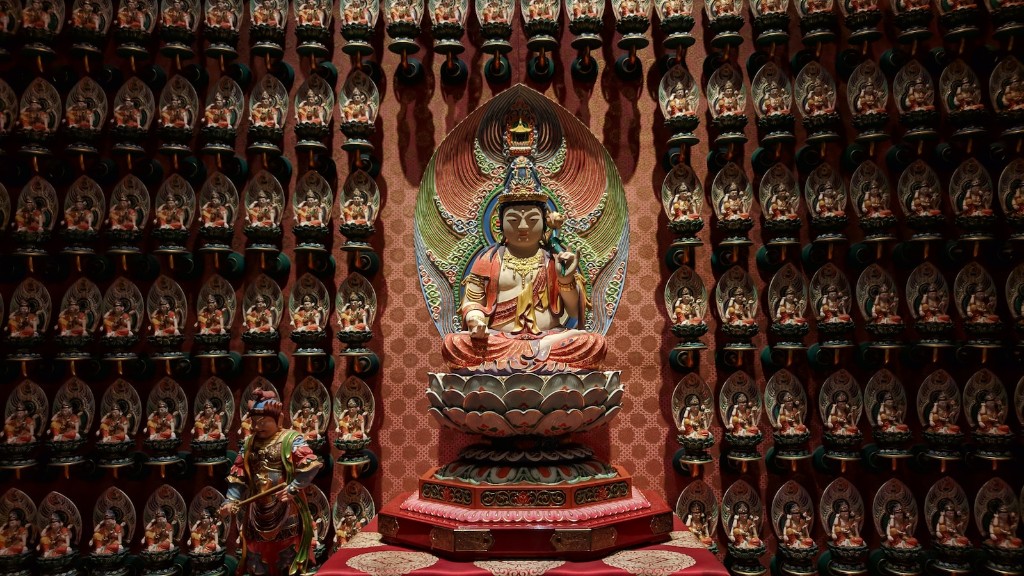Buddhism is a religion based on the teachings of Siddhartha Gautama, who was born in Nepal in the 6th century BCE. He came to be known as the Buddha, or “enlightened one.” The Buddha taught that the way to end suffering is to free oneself from attachment to material things and desires. This can be achieved through following the Eightfold Path, which includes practices such as meditation and ethics.
There are four Noble Truths in Buddhism: the truth of suffering, the truth of the origin of suffering, the truth of the cessation of suffering, and the truth of the path leading to the cessation of suffering.
What are the 3 main beliefs of Buddhism?
Buddhism is a religion that is based on the teachings of Siddhartha Gautama. The main principles of this belief system are karma, rebirth, and impermanence.
Karma is the belief that our actions have consequences, both good and bad. We are reborn into different forms based on our karma.
Impermanence is the belief that nothing in this world is permanent. Everything is constantly changing and will eventually come to an end.
The Five Precepts are basic guidelines for living a moral and ethical life. The first precept is to refrain from taking life, which means not killing any living being. The second precept is to refrain from taking what is not given, which means not stealing from anyone. The third precept is to refrain from the misuse of the senses, which means not having too much sensual pleasure. The fourth precept is to refrain from wrong speech, which means not lying or speaking badly of others. The fifth precept is to refrain from intoxicants that cloud the mind, which means not using drugs or alcohol.
What are the main beliefs in Buddhism called
The Three Universal Truths are:
1. All things are impermanent.
2. All things are suffering.
3. All things are non-self.
The Four Noble Truths are:
1. The truth of suffering.
2. The truth of the cause of suffering.
3. The truth of the end of suffering.
4. The truth of the path leading to the end of suffering.
The Noble Eightfold Path is:
1. Right understanding.
2. Right thought.
3. Right speech.
4. Right action.
5. Right livelihood.
6. Right effort.
7. Right mindfulness.
8. Right concentration.
There are a few main values that Buddhists hold dear, and these are love, wisdom, goodness, calmness and self-control. Buddhists believe that it is important to end suffering in the world, and that all things are interconnected and interdependent. They see the world as being in a constant state of flux, and believe that it is important to live in the present moment.
What is one of the most important beliefs in Buddhism?
The Four Noble Truths are the essence of Buddha’s teachings. They are the truth of suffering, the truth of the cause of suffering, the truth of the end of suffering, and the truth of the path that leads to the end of suffering. Buddha’s teachings are based on these Four Noble Truths.
Buddhism is a religion that does not acknowledge a supreme god or deity. Instead, followers focus on achieving enlightenment—a state of inner peace and wisdom. When followers reach this spiritual echelon, they are said to have experienced nirvana. The religion’s founder, Buddha, is considered an extraordinary being, but not a god.
What are the 7 principles of Buddhism?
The Seven Factors of Awakening are important in Buddhism because they represent the path to awakening. By practicing these factors, one can develop mindfulness, investigation of reality, energy, joy, relaxation, and concentration.
Buddhism is a religion based on the teachings of Siddhartha Gautama, who was born in Nepal in the 6th century BC. Buddhism rejects the caste system of Hinduism and teaches that all beings are equal. Buddhism also teaches that the only way to escape suffering is to achieve Nirvana, which is a state of complete peace and freedom from desire. To achieve Nirvana, Buddhists must follow the Eightfold Path, which includes wisdom, understanding, and compassion.
Do Buddhists believe in heaven
In Buddhism, there is no concept of punishment or reward. There is no divine being who decides who goes to hell or heaven. There is merely the illusory results of our thought, words and deeds, which we call karma.
Buddhist teaching generally views life and death as a continuum, believing that consciousness (the spirit) continues after death and may be reborn. Death can be an opportunity for liberation from the cycle of life, death and rebirth.
What do Buddhists worship to?
People go to the temple to worship the image of Buddha. Worshippers usually sit on the floor barefoot. Worshippers give offerings to Buddha such as flowers or candles. Worship is led by monks and is mostly meditation and chanting.
The Ten Grave Precepts are:
Respect life – Do not kill
Be giving – Do not steal
Honor the body – Do not misuse sexuality
Manifest truth – Do not lie
Proceed clearly – Do not cloud the mind
See the perfection – Do not speak of others’ errors and faults
Realize self and others as one – Do not elevate the self and blame others
What is sin to a Buddhist
According to Buddhism, sin does not refer to any personal God or Supreme Being. Instead, it refers to the evil elements that defile the mind and have a negative impact on the psyche. This can make it difficult for the individual to achieve spiritual enlightenment.
It is interesting to note that some high level Buddhists have drawn comparisons between Jesus and Buddhism. For example, in 2001 the Dalai Lama stated that “Jesus Christ also lived previous lives”, and added that “So, you see, he reached a high state, either as a Bodhisattva, or an enlightened person, through Buddhist practice or something like that”. This shows that there are some similarities between the two religions, and that it is possible to learn from both.
Do Buddhists celebrate Christmas?
Despite what many people believe, many Buddhists do celebrate the holiday season. In fact, among Asian American Buddhists, three-quarters celebrate Christmas. On Dec 8, some Buddhists also observe Bodhi Day, which marks the Buddha’s enlightenment. So, while the holiday season may look different for Buddhists than for other people, it is still a time of joy and celebrating for many of them.
For Buddhists, karma is a powerful force that extends beyond this life. Bad actions in a previous life can follow a person into their next life and cause bad effects (which Westerners are more likely to interpret as ‘bad luck’). Even an Enlightened One is not exempt from the effects of past karma. Thus, it is important for Buddhists to be mindful of their actions and to try to live in a way that will create good karma.
Warp Up
Buddhism teaches that all beings have Buddha-nature and are capable of becoming enlightened. The path to enlightenment includes the Four Noble Truths, which teach that suffering exists, that suffering has a cause, that suffering can be ended, and that there is a path to the end of suffering. The path to the end of suffering includes the Noble Eightfold Path, which teaches right view, right intention, right speech, right action, right livelihood, right effort, right mindfulness, and right concentration.
There are a few major beliefs in Buddhism. The first is that everything is connected. The second is that everyone has the potential to be enlightened. The third belief is that the path to enlightenment is through meditation and mindfulness.


